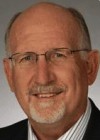Defending the “F-word,” the “S-word” and giving kids an allowance
I spent Fathers Day reflecting on what a poor job my dad did raising me. His approach was pathetic.
Of course, I wouldn’t have been aware of his parenting shortfalls were it not for the child-rearing advice Professor Jack A. Chambless dispensed with such certitude in his guest column “Fathers, here’s an economist’s guide for raising savvy kids” (Orlando Sentinel, June 19).
The professor’s admonitions were simple: (1) “Never give a kid an allowance.” (2) “Never force your child to share—anything.” (3) “Ban the ‘F-word’ (no, not that one) from your home.”
Let’s consider his assertions in reverse order.
The “F-word” (“fair”) and it’s many variants—words that are banned in the Chambless household—rated high among the values my father attempted to instill in his children. We heard the word often.
Despite acknowledging that we live in a world of rampant injustice, my father believed that not only must we personally treat everyone fairly, we also have an obligation to create fairness wherever it doesn’t exist and wherever it’s within our power to help correct the inequity.
Fair meant that my father allowed African-Americans to hunt on our farm—because he believed it was unfair that most of his fellow farmers had a whites-only hunting policy.
In fact, fairness was an integral part of his religion. Jesus said we should treat others the way we would want to be treated if the situation were reversed. My father bought in to that philosophy and sought to instill it in his children.
Closely associated was sharing. Fairness and sharing were basic life principles. And such essential values simply had to be inculcated into the children whose life philosophy he was helping to shape. Unlike Professor Chambless, my father would not tolerate any unwillingness on the part of his children to share.
My father believed in the Bible’s “radical doctrine of human non-ownership.” He argued that we are simply the stewards (managers) of blessings that come from God. Thus, not sharing liberally would be out of the question.
My father persevered with employees whose problems negatively impacted their productivity—and thus his profits. But it kept their families from being thrown into the street. Certainly, from a narrow economic perspective, my father had it completely wrong.
In fact, when my mother died (about three years after my father’s death), long-term health issues for both had eroded my share of the family “fortune” to just over $800. But because of what my father had taught me about fairness and sharing, I simply endorsed my inheritance check and sent it back to the two of my sisters who’d lived closest to our parents and had invested the most time and energy in their care. I later learned that another sister had likewise returned her check. Clearly, our father’s bad influence had been strong.
As for giving kids an allowance, the something-for-nothing attitude Professor Chambless describes couldn’t have existed in our home. From three or four years of age, every child had an array of household and/or farm chores to do. Sharing the workload was the only way to get the tasks done.
The work we did as children freed up the breadwinners to earn income. So allowances weren’t a quid pro quo in which every task was compensated on the basis of its actual market value.
Rather, allowances were merely the parental breadwinners’ affirmation that everyone’s contribution was essential if the family was to function optimally. To know that we were each shouldering our fair share of the load was a matter of personal pride.
My father did share at least two characteristics with Professor Chambless: His voting favored Republicans over Democrats (to my knowledge, he never voted for a Democrat!). And he too was outspoken.
So had the professor’s child-rearing article appeared in our local newspaper, my father would have made it clear to his children exactly what he thought of such a philosophy. And his assessment definitely wouldn’t have been positive.
James Coffin is executive director of the Interfaith Council of Central Florida.

